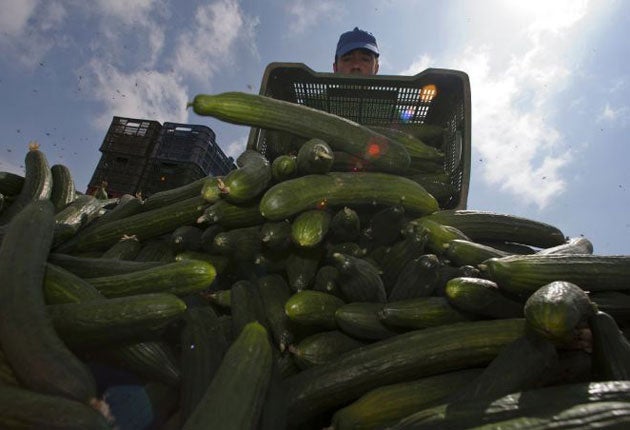Your support helps us to tell the story
From reproductive rights to climate change to Big Tech, The Independent is on the ground when the story is developing. Whether it's investigating the financials of Elon Musk's pro-Trump PAC or producing our latest documentary, 'The A Word', which shines a light on the American women fighting for reproductive rights, we know how important it is to parse out the facts from the messaging.
At such a critical moment in US history, we need reporters on the ground. Your donation allows us to keep sending journalists to speak to both sides of the story.
The Independent is trusted by Americans across the entire political spectrum. And unlike many other quality news outlets, we choose not to lock Americans out of our reporting and analysis with paywalls. We believe quality journalism should be available to everyone, paid for by those who can afford it.
Your support makes all the difference.A deadly outbreak of E.coli centred in Germany and spreading across Europe is caused by a dangerous new strain, Chinese scientists who analysed the bacteria said.
The scientists said the outbreak, which has killed 17 and made more than 1,500 others ill in at least 10 European countries and is thought to come from vegetables, carried genes making it resistant to several classes of antibiotics.
"This E. coli is a new strain of bacteria that is highly infectious and toxic," said the scientists at the Beijing Genomics Institute in Shenzhen city in southern China who are collaborating with colleagues in Germany.
World Health Organisation spokesperson Aphaluck Bhatiasevi said the WHO was waiting for more information from laboratories. "This strain has never been seen in an outbreak situation before," he said.
In a worsening trade row prompted by the outbreak, Russia banned imports of all raw vegetables from the European Union, prompting an immediate protest by the European commission.
Moscow had already banned imports of vegetables from Germany and Spain over the outbreak, which German officials originally blamed on contaminated cucumbers imported from Spain before backtracking and apologising to Madrid.
Gennady Onishchenko, head of the Russian consumer protection agency Rospotrebnadzor, said the deaths caused by the outbreak "demonstrate that the much-praised European sanitary legislation, which Russia is being urged to adopt, does not work," Interfax news agency reported.
The new ban would take effect this morning, he said. The European Commission said it would write to Moscow within hours to say the move was disproportionate.
Spain is threatening legal action over the crisis. It wants compensation for its farmers, who say lost sales are costing them 200 million euros a week and could put 70,000 people out of work.
Spanish Prime Minister Jose Luis Rodriguez Zapatero said the European Commission had been slow to act.
"I would have liked a clearer reaction from the Commission, above all to clarify the rules of the game in the European Union on borders," Zapatero said in an interview on state radio RNE.
"The German federal government should know that it has an overall responsibility to other states in the European Union and we shall ask for very forthright explanations and of course will demand sufficient reparations."
Reinhard Burger, head of German disease control agency the Robert Koch Institute (RKI), admitted there "still is no indication of a definable source".
The RKI reported 365 new E.coli cases yesterday and said a quarter of them involved a life-threatening complication of a type of E.coli known as Shiga toxin-producing E.coli (STEC).
The World Health Organisation said it had also been notified of cases in Austria, Denmark, France, the Netherlands, Norway, Spain, Sweden, Switzerland and Britain.
All these cases except two are in people who had recently visited northern Germany or in one case, had contact with a visitor from northern Germany, it said. There are many hospitalised patients, several of them requiring intensive care, including dialysis due to kidney complications.
EU officials have said three cases of E.coli linked to the German outbreak have also been reported in the United States.
EU health experts say they are shocked by the outbreak, which is on a scale never seen before in the region.
Denis Coulombier, head of surveillance and response for the European Centre for Disease Prevention and Control (ECDC), which monitors disease in the EU, said studies so far show a strong link between disease symptoms and the consumption of fresh vegetables in Germany.
"To have such a high number of severe cases means that probably there was a huge contamination at some junction," he told Reuters in an interview. "That could have been anywhere from the farm to the fork - in transport, packaging, cleaning, at wholesalers, or retailers - anywhere along that food chain."
European Union countries exported 594 million euros worth of vegetables to Russia last year while EU imports of vegetables from Russia were just 29 million euros, EU data show. It was not clear what proportion of that was raw.
France, Germany and Poland are the biggest exporters of fruits and vegetables to Russia, an EU spokesman said.
High-end Russian grocery store chain Azbuka Vkusa, which sources more than 40 percent of all its fresh vegetables and fruit from Europe, said it had not received official notice of the ban but was getting ready to dump prohibited items.
"For example, we can replace European tomatoes with the Azeri ones we already have on our shelves," spokesman Igor Yadroshnikov told Reuters. "Radishes and carrots from Europe can be swapped for Russian ones; squash, eggplants and peppers trucked in from Europe can be replaced with Turkish ones."
Health experts are advising people travelling to Germany to avoid eating raw tomatoes, cucumbers and salad.
"Anyone returning from Germany with illness including bloody diarrhoea should seek urgent medical attention," Britain's Health Protection Agency said in a statement.

Join our commenting forum
Join thought-provoking conversations, follow other Independent readers and see their replies
Comments